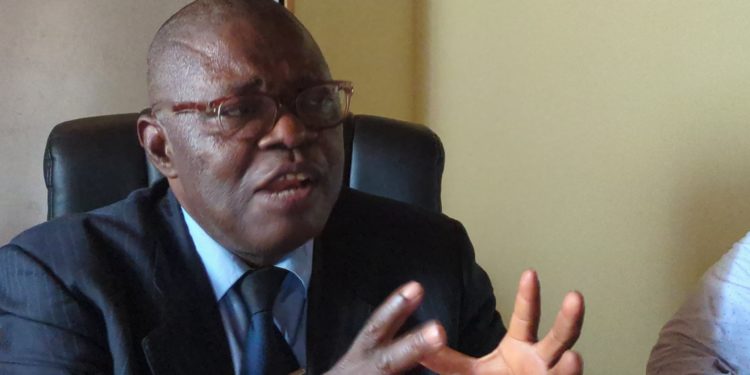By Kemo Cham
Sierra Leone must safeguard gains made in the fight against maternal mortality by enforcing professionalism among health workers, a leading healthcare campaigner has said.
Victor Lansanah Koroma, Executive Director of Health Alert, cautioned that complaisance could reverse progress in the healthcare sector in the last decade, particularly in the area of maternal and infant deaths. He said that many cases of maternal deaths in the country are attributable to the unpleasant experience service users are subjected to by unscrupulous healthcare workers, which discourage them from returning to health centers.
“Death is inevitable, but it is preventable,” the activist said at a press briefing on Thursday, adding that deaths that occur in health facilities due to recklessness on the part of service provides are unacceptable.
Koroma was speaking about the contributions of initiatives like the Youth For Health (Y4H), a project co-implemented by his organization, to the gains made in efforts against maternal mortality.
Y4H is a two-year European Union funded initiative designed to expand family planning and sexual and reproductive health services for adolescents. It is part of an international initiative implemented by Marie Stopes International in seven countries. Health Alert is its local partner in Sierra Leone.
Following the end of its eleven years’ civil war, Sierra Leone was ranked among countries with the highest rate of maternal and infant deaths. When the war ended in 2002, MMR stood at 1,682 per 100,000 live births, according to UN data.
A 2019 report analyzing MMR trend in Sierra Leone from 2000 to 2017 ranked it as one of the three countries with the highest MMR out of 186 countries globally.
Consequently, Sierra Leone was listed at the bottom of the United Nations Human Development Index. And maternal mortality is considered a major determinant of a country’s ranking on the index.
Lack of access to sexual and reproductive healthcare services was identified as a major contributing factor to the country’s high maternal death rates, fuelled by teenage pregnancy and unsafe abortion practices.
Thanks to several initiatives implemented by successive governments and international and local partners like Health Alert, these numbers have gradually reduced.
From 2013 to 2019, maternal death declined from 1,165 per 100, 000 live births to 717 per 100, 000 live births.
Data from the UN Maternal Mortality Estimation Inter-Agency Group published by the Ministry of Health in April show that MMR has further reduced from 443 in 2020 to 354 in 2023, representing 78 percent reduction since 2000. It is described as one of the steepest decline in maternal deaths in Africa. And the UN says it puts Sierra Leone on the trajectory of further reducing MMR to under 300 by 2025.
But for Health Alert, the fight is far from over.
“For us, that’s not the end…,” says Koroma, warning that reports from heath facilities across the country indicate that unprofessional practices persist among a pockets of health workers.
Data from the 2017, 2018 and 2019 Maternal Death Surveillance and Response reports show that more than 80 percent of maternal deaths occurred at health facilities, of which 75 percent occurred at government hospitals.
UN and government data show that an overwhelming number of maternal deaths that occur in Sierra Leone are due to preventable factors. It also show that most of the deaths are preventable if life-saving preventive and therapeutic interventions are provided in a timely manner.
Experts say that even when pregnancy related complications do not result in death, some women are left with life-long debilitating conditions such as obstetric fistula.
To address all this, timely administration of Emergency Obstetric and New Born care services is crucial.
And campaigners say this is where the attitude of health workers come into play. According to Health Alert, nurses waste precious time quizzing service seekers on irrelevant matters about their personal life, sometimes bordering on insults.
“Young people have been complaining that they go to these facilities, healthcare providers have not been treating them properly. They would shout at them. They would treat them in a manner that is very demeaning,” Dalton John, Programmes Manager at Health Alert, explained in a power point presentation.
Thursday’s press briefing held at the head office of Health Alert in the east end of Freetown was meant to share successes, challenges and opportunities offered by the project as it draws to a close.
Koroma told journalists that any country that is unable to reduce its maternal mortality, regardless of the state of their economy or their human rights record, is doomed to the bottom of the human development index.
“If you are losing lives, then what are you saying about your economy? These are the human resources we are talking about,” he said.
H4Y was implemented in three districts: Port Loko, Kambia and the Western Area Rural, where the partners also reviewed the essential drug list and embarked on sensitization against the dangers of antibiotic misuse, especially among young people, among other activities that are geared towards promoting recommended health seeking behaviours.
Through this project, Health Alert and Marie Stopes supported the Ministry of Health in reviewing several policies geared towards improving accesses to family planning and sexual and reproductive health services. Among these is the review of the National Teenage Pregnancy Secretariat’s five-year strategic plan.
The project also entailed training of health workers about rights based approaches to healthcare, engaging of local council and district health authorities and promoting domestic revenue mobilization to potentially fund healthcare services without reliance on donors.
The project further supported the development of the safe motherhood bill, which is currently in parliament awaiting enactment.
“We want girls to be empowered, to be able to complete their schooling, to go to university, to be productive, to be responsible citizens and to be able to take care of themselves,” said Sandy Massaquoi, Advocacy and Communication Manager at Marie Stopes Sierra Leone. “But you cannot do that when you don’t protect them when it comes to family planning services.”






















